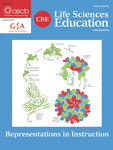Departments Can Develop Teaching Identities of Graduate Students
Dear Editor:
Reform of introductory science courses seeks to increase student retention and learning, yet faculty members are often unaware of modern teaching practices and/or not motivated to change their practices. Brownell and Tanner (2012) outlined another potential barrier: scientific professional identities are defined primarily by research and not by teaching. We think this is also an issue for graduate teaching assistants (GTAs), who play major roles in undergraduate science courses and represent the future of academic instruction. As graduate students interested in teaching, we call attention to the need for a national dialogue regarding development of GTA teaching identities.
GTAs bear a heavy burden of implementing reformed curricula in introductory laboratories and discussions, often with little professional development. Although institutions may offer teaching orientations, these often focus on instructional policies and not on reformed teaching practices (Golde and Dore, 2001), potentially sending a message that teaching is more concerned with following institutional rules than fostering student learning. We think this is a lost opportunity to infuse universities across the country with a new generation of faculty who see teaching as an important part of their professional identities.
We believe that science departments can develop GTAs’ professional identities as scholars and teachers by including teaching as part of the apprenticeship culture. GTAs develop research skills by taking classes, learning techniques, and applying this knowledge to their research with the support and feedback of a graduate committee and peers. Likewise, GTAs could take courses on effective teaching practices, be mentored, have their teaching evaluated by peers and faculty, and apply their teaching skills in increasingly independent instructional roles.
A balanced research and teaching apprenticeship as a regular part of departmental practice could generate a new generation of faculty with professional identities as teachers and scholars. In this letter, we offer suggestions based on changes we are currently implementing in our department that may foster this teacher–scholar professional identity.
To include teaching as part of the apprenticeship program, a committee of faculty and experienced GTAs should oversee graduate teaching. In our department, GTA research and teaching are both overseen by a graduate affairs committee. We are separating the teaching and research oversight into separate committees, so the teaching aspect of the committee is not subsumed by a focus on research. This graduate teaching committee (GTC) will make teaching assignments, conduct and review assessments of teaching, and provide opportunities for teaching seminars.
The GTC will make teaching assignments with professional development of teaching in mind, as opposed to solely considering departmental need. Yearly information regarding each graduate student's teaching experience, teaching assessment results, and future teaching goals will be collected by the GTC. The GTC will then match the teaching skills of each GTA with available courses. For example, a laboratory class with a defined curriculum and more faculty oversight may require less pedagogical skill and be more appropriate for a new GTA than a discussion class would be.
In our department, the only teaching feedback GTAs currently receive is the numeric and written responses from university student evaluations. In upcoming years, GTAs will be required to have a yearly observation of their teaching by a peer GTA mentor and the faculty for whom they teach. GTAs and their peer mentors will analyze the teaching observations and student evaluations and submit a summary teaching statement to the GTC each year. We believe this will encourage reflective practice, and these statements can be used by the GTC to make future teaching assignments.
GTAs who receive positive evaluations by the GTC, peers, and faculty will have the option to teach courses in which they would act with more instructional autonomy, including being lecture assistants and possibly course instructors, and will qualify to serve as peer mentors. GTAs with the highest instructional skills and interest in teaching could become involved in departmental curriculum reform, a role often reserved for faculty.
In addition to the teaching orientations currently offered by the institution and division of biology, we have recommended that our department initiate a first-year seminar series led by experienced GTAs or faculty. The first seminar would focus on science communication skills and the second on modern teaching practices. These seminars would also provide a forum for discussing first-year teaching challenges and successes. However, due to heavy course work demands in the first year of our graduate program, these seminars may be held in the second year and modified to better match the teaching needs of second-year GTAs.
Development of teaching abilities may help GTAs balance research and teaching responsibilities throughout their academic careers by fostering a professional identity that supports both aspects of an academic life (French and Russell, 2002; Feldon et al., 2011). We believe that graduates with these professional identities could be more competitive for faculty positions and that this system would foster a generation of faculty capable of enacting undergraduate science education reforms.
ACKNOWLEDGMENTS
The authors thank their departments within the Division of Biology, University of Tennessee, and their advisors for supporting their interest in teaching.
FOOTNOTES
Present addresses: †Department of Ecology and Evolutionary Biology, Yale University, New Haven, CT 06511
‡Jefferson County High School, Dandridge, TN 37725.



